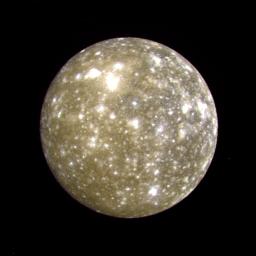Callisto False Color
Caption:
This false color picture of Callisto was taken by Voyager 2 on July 7, 1979 at a range of 1,094,666 kilometers (677,000 miles) and is centered on 11 degrees N and 171 degrees W. This rendition uses an ultraviolet image for the blue component. Because the surface displays regional contrast in UV, variations in surface materials are apparent. Notice in particular the dark blue haloes which surround bright craters in the eastern hemisphere. The surface of Callisto is the most heavily cratered of the Galilean satellites and resembles ancient heavily cratered terrains on the moon, Mercury and Mars. The bright areas are ejecta thrown out by relatively young impact craters. A large ringed structure, probably an impact basin, is shown in the upper left part of the picture. The color version of this picture was constructed by compositing black and white images taken through the ultraviolet, clear and orange filters.
Cataloging Keywords:
| Name |
Value |
Additional Values |
| Target |
Callisto |
|
| System |
Jupiter |
|
| Target Type |
Satellite |
Planet |
| Mission |
Voyager |
|
| Instrument Host |
Cassini Orbiter |
Voyager 2 |
| Host Type |
Orbiter |
Flyby Spacecraft |
| Instrument |
Imaging Science Subsystem (ISS) |
|
| Detector |
|
|
| Extra Keywords |
Color, Crater, Impact, Ultraviolet |
| Acquisition Date |
|
| Release Date |
1996-09-26 |
| Date in Caption |
1979-07-07 |
|
| Image Credit |
NASA/JPL |
| Source |
photojournal.jpl.nasa.gov/catalog/PIA00457 |
| Identifier |
PIA00457 |

